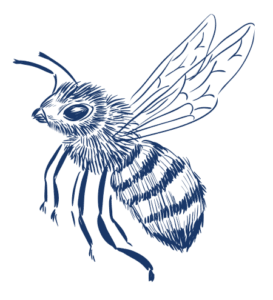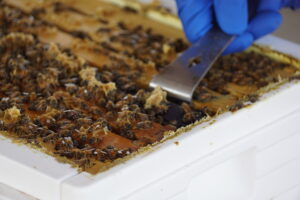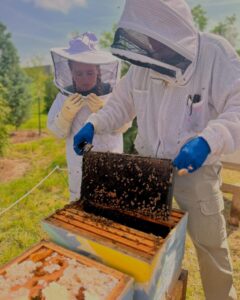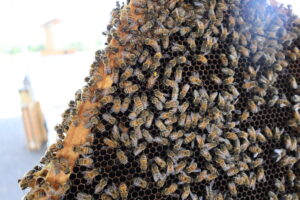The Keeper of Keepers: LU Honeybee Extension Supports Oklahoma Bees and Farmers

(This story was originally published in ‘E Roar | Volume 2 Issue 5 on Sept. 12, 2025)
By Jet Turner
As dusk turns to dark, the last of us buzz our way back into the hive to rest for the night. This time, the doors close behind us. Unusual, but not an issue. We settle into our honeycombs for the night, awaiting the morning sun.
A jarring of the hive awakes us in the morning. Strange noises come from the outside. The jarring finally ends and our home stands still for a moment until rhythmic vibrations shake the colony.
Before long the vibrations cease. Those same jarring movements follow, but quickly end. The hive is still.
Finally, the doors open and we stretch our wings, leaving the hive in droves. We don’t recognize where we are, so we fly in figure eights, trying to get our bearings. Slowly, we are able to inch further and further away from our home and into a new land where new nectar awaits–all in support of our queen and colony.
While this scene may seem dramatic, in a couple of days the honeybees within this colony will adjust to their new environment and continue with their normal duties, unaware of the tremendous benefit they are providing to the crops surrounding their hives and the farmers who harvest them.
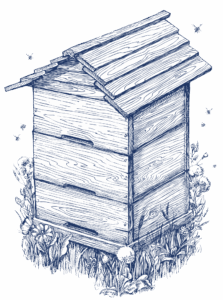
Hank Baker, the honeybee extension educator and administrator of research at Langston University, said simply placing one honeybee colony in front of crops can increase yields by 60-70%. While bees are an excellent resource for agriculturalists, beekeeping is full of challenges. Without proper training, many will quit.
“With honeybees and their management, there’s a really large learning curve,” Baker said. “Almost 80% (of people) that get into honeybees quit within the first three years. They’ll quit because they don’t have any help. Their bees will die in the first year, and they’ll try again, and then their bees will die again, and they’ll try it again.”
Anyone can find beekeeping training programs and resources online, but that material pales in comparison to hands-on training in the field.
This is where Langston University’s honeybee extension program excels.
“One of the things that I pride ourselves on in our program is we go in and we help those farmers manage their colonies so they have successes instead of failures,” Baker said. “I am out in the field every day. I probably call on half a dozen farmers a day, showing up and going through those colonies with them.
“You’ll learn more in an hour-long visit than from a six-month class.”
Although this program has only been around for about a year and a half, Baker’s hands-on approach to helping Oklahomans with their honeybee colonies has already made a difference.
A disabled veteran from Kingfisher County, who uses beekeeping as a therapeutic hobby, enjoyed nothing more than sitting on the porch and watching his bees. One day, he discovered all six of his colonies were in trouble, so he called Baker for support.
Baker traveled out to the veteran’s home to see if he could help save the colonies, but unfortunately, there were almost no bees left.
Within 7-10 business days, Baker had two new colonies installed in the bee boxes the veteran already owned. Now, Baker receives regular text messages and calls from the veteran thanking him for his help and updating him on the bees.
A beekeeper in Choctaw told Baker he has quadrupled his honey production just from Baker going on-location to help him over the last year.
A farmer from Wetumpka and her husband have been gardening for years, and often sell their produce at the Norman farmers’ market. They recently lost all but one of their six honeybee colonies. Baker visited the farmers and quickly installed new colonies and new queens. Now, their business is back up and running, and the couple stay in regular contact with Baker about the status of their bees.
These are just a couple of instances where Baker and the honeybee extension program have made a difference. Baker helps people tend to their honeybees in all 77 Oklahoma counties and has reached over 500 individuals through various programs and workshops. These include on-site farm visits and LU campus workshops as well as collaborations with other organizations such as Oklahoma State University, Hives for Heroes, local elementary schools and nearby cities, performing services and workshops off campus.
“The farmers that we help, I usually pay them a visit about once a month,” Baker said. “So after about six visits, they’re getting a pretty good handle on (beekeeping) and they don’t need as much help. Then, they start to mentor other people around them. It kind of snowballs from there.”
The Langston University honeybee extension program also assists public parks and other similar spaces, for a bee’s role as a pollinator keeps the park grass and other vegetation healthy and lively.
Recently, Baker helped Scissortail Park in Oklahoma City escape a vicious cycle. Each year the park bought new bees because their colonies would die in the winter.
Baker was asked to come evaluate the bees, and he discovered the colonies were not producing enough wax for the queen to lay eggs in. He took several frames from the bee boxes home and heavily hand waxed them. Now, the bee population in the park is able to expand, and the park no longer needs to buy new queens every year.
While detailed data is still being gathered, preliminary outcomes indicate measurable economic benefits to Oklahomans, such as increased income and productivity among participants. According to stakeholders, the average income increase for program participants has grown substantially, reflecting gains in produce output, honey production, sustainable honeybee populations and entrepreneurial success.
“I’m proud of the quality of outreach that we do,” Baker said. “It’s only been a year and a half, and the quality of work that we’re performing in the field and the number of people we are helping is tremendous.”



